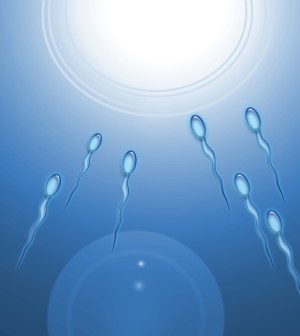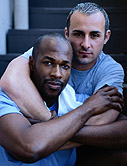- 8 Ways to Increase Dopamine Naturally
- 7 Best Breads for Maintaining Stable Blood Sugar
- Gelatin vs. Collagen: Which is Best for Skin, Nails, and Joints?
- The Long-Term Effects of Daily Turmeric Supplements on Liver Health
- Could Your Grocery Store Meat Be Causing Recurring UTIs?
- Are You Making This Expensive Thermostat Error This Winter?
- Recognizing the Signs of Hypothyroidism
- 10 Strategies to Overcome Insomnia
- Could Artificial Sweeteners Be Aging the Brain Faster?
- Techniques for Soothing Your Nervous System
Scientists Get Closer to Genetics of Homosexuality in Men


Scientists are reporting that they’ve linked the way genes in certain regions of the human genome work to influence sexual orientation in males.
The findings don’t explain how such variations in the workings of these genetic regions might affect sexuality in one or both genders. But the authors of the new study say they’ve been able to use this information to successfully predict the sexual orientation of male identical twins 70 percent of the time, compared to the 50 percent that would be expected by chance.
Twins have the same genes, so something else — such as the way genes operate — may explain those who don’t have the same sexual orientation, the authors suggested.
“Sexual orientation seems to be determined very early in life,” said study lead author Tuck Ngun, a postdoctoral researcher at the David Geffen School of Medicine of the University of California, Los Angeles. “Based on these findings, we can say that environmental factors might play a role in sexual orientation.”
But he doesn’t mean the social environment in which we grow up, such as how we’re treated by our parents.
“Instead, we are referring to differences that the twins could have experienced in the womb,” Ngun explained.
Several past studies have linked sexual orientation to specific genetic regions, “but what’s still a mystery is the specific genes that are involved,” Ngun said. “Sexual attraction is a fundamental drive across all species but it is something that is poorly understood on the genetic level, particularly in humans.”
In the new study, researchers sought to better understand the links between how genes work — not just the existence of certain genes or genetic variations — and sexual orientation.
The investigators looked at identical twins because they share the same DNA. However, genes are also affected by the environment each twin experiences, so they’re not clones of each other in terms of how their bodies work, according to the researchers.
The researchers began with information on 140,000 genetic regions and narrowed them down to five regions that appear to have the ability to predict — 70 percent of the time — whether an identical male twin is gay or straight based on how genes in those regions work or “express” themselves.
The researchers reached that level of accuracy by seeing if they could predict sexual orientation in 10 pairs of male gay twins and 37 male pairs in which one twin is gay and the other is straight, the study said.
“We weren’t expecting 100 percent since we are only looking at a small part of the overall picture,” Ngun said.
The genetic regions in question play various roles in the body, Ngun explained, including affecting sexual attraction.
Qazi Rahman, a senior lecturer in cognitive neuropsychology at King’s College London in the United Kingdom, who studies sexual orientation, praised the study. While it’s small, the study’s design is strong, he said.
Rahman added that the study “tells us something about possible environmental differences — albeit biological differences in the environment — which might explain the sexual orientation of men who share the same genome.”
Some people in the LGBT community have expressed concern about research into the biological roots of sexual orientation because they fear it could be used to target gays and even abort fetuses who seem likely to not be heterosexual. “I am gay, so these questions have a lot of resonance with me on a personal level,” study lead author Ngun said.
“I do think we have to tread carefully because the potential for abuse is there. Although I think it’s highly unlikely that the findings of this particular research study would lead to a genetic test, future research could ultimately lead to something like that,” he added.
Society is going to have to work together, Ngun suggested, “to ensure research on sexual orientation is not misused.”
The study is scheduled to be presented Thursday at the annual meeting of the American Society of Human Genetics in Baltimore. Research presented at meetings hasn’t yet undergone peer review, and is generally considered preliminary until published in a peer-reviewed journal.
More information
For more about sexual orientation, visit the American Psychological Association.
Source: HealthDay
Copyright © 2026 HealthDay. All rights reserved.










